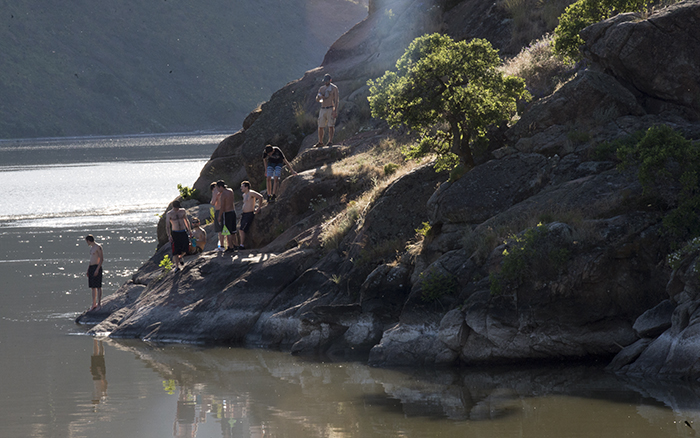Cliff jumping at Granite Point discouraged by rangers
Rachel Sun | The Daily Evergreen
Although “the cliffs” is a popular swimming spot, park rangers warn of jumping dangers.
July 19, 2017
Located roughly 20 miles outside Pullman, Granite Point is monitored by park rangers to satisfy that safety regulations are being met. On more than one occasion, cliff jumping has led to injury or death, prompting a ban on jumping or diving from “the cliffs,” as it is nicknamed.
Park Ranger of the U.S. Army Corps of Engineers Sara Jones said that Granite Point visitors ought to avoid cliff-jumping because of the additional dangers. Water elevations and strong currents typically mask the risks associated with cliff jumping, she said.
“Typically, park visitors are not technically trained or experienced high divers,” Jones said, “and the combination of the adrenaline rush, extreme hazards, inexperience and often alcohol is a recipe for cliff jumping accidents.”
Four years ago, WSU employee Andrew Duke was visiting “the cliffs” when he fell 50 feet to his death, as reported by The Spokesman-Review. Alcohol likely played a role in the fatality, as the jump was not believed to be intentional.
In two decades, multiple injuries and three known fatalities have occurred in patrolled areas along the Snake River, Jones said.
Intentionally jumping from great heights into water is inherently dangerous, according to Rob Harris of Live Strong.
“When diving from great heights, water doesn’t soften your landing,” Harris said. “The speeds at which you hit the water make it feel like you are hitting a wall instead of liquid.”
Jones added that hitting the water at even the slightest wrong angle could make your next breath your last.
But, fatalities can occur before visitors attempt a jump as well.
“The rocky hillsides and sheer cliffs that must be climbed to access jumping perches offer little traction and stability,” Jones said, “which also contributes to the jumping and diving injuries and fatalities on Corps-managed public lands and waters.”
Any injuries before, during or after jumping off a cliff increases the risk of drowning, Harris said. He mentioned that after hitting the water — even if you aren’t unconscious from your injuries — it can be challenging for rescuers to make a difference.
Granite Point’s highest cliff is about 30 feet high, according to the Whitman County website. To deter anyone thinking about jumping, the U.S. Army Corps of Engineers banned all types of cliff jumping or diving in 2008.
“Public safety is the Corps’ highest priority, and we encourage all visitors to adhere to regulations for their own safety and the safety of others,” Jones said. “The goal of park rangers is to ensure visitor safety and enforce federal regulations.”






















